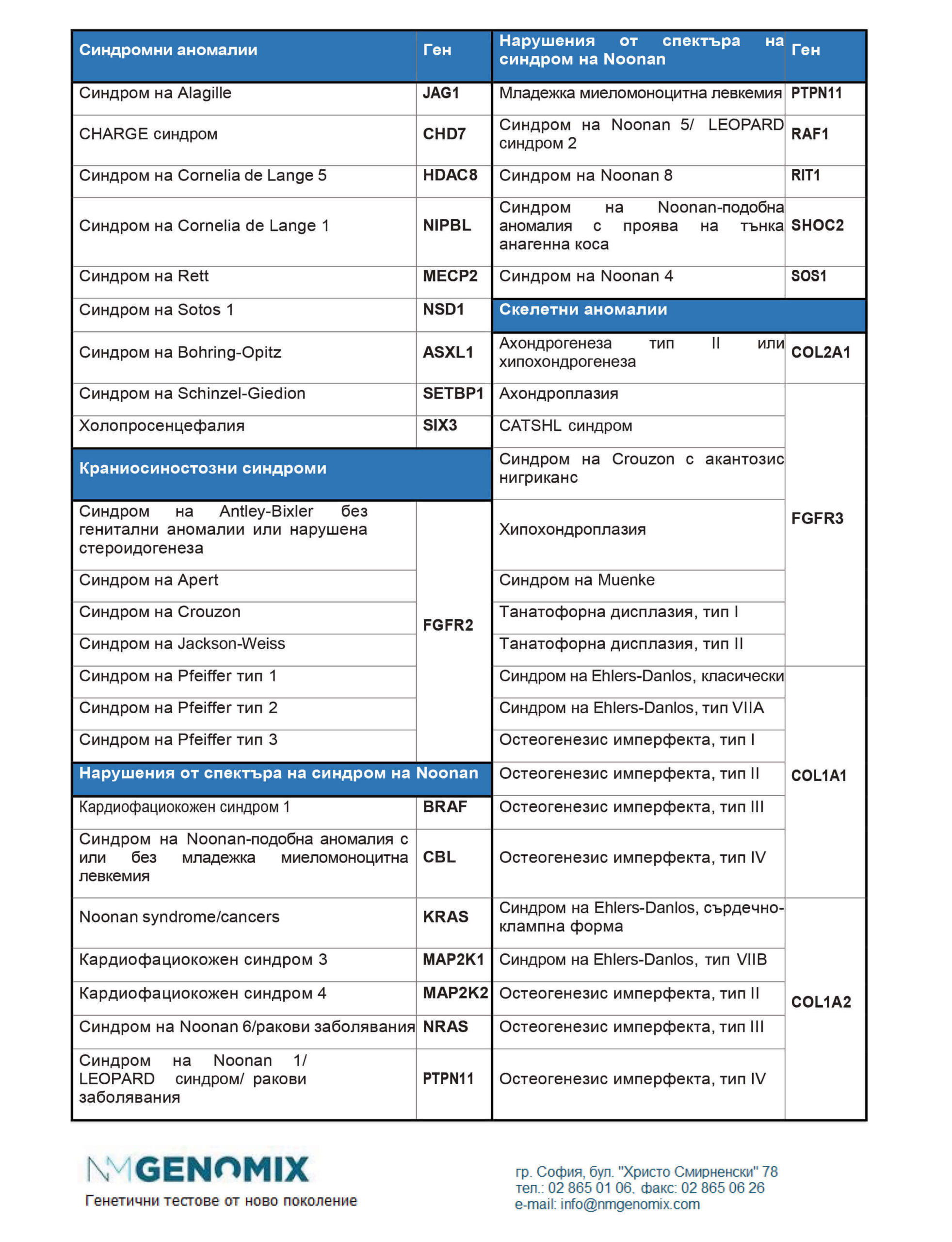First non-invasive prenatal test covering risk of 49 genetic abnormalities
Expectant mothers in Bulgaria can now take the GeneSafe test - the first non-invasive prenatal test for a wide range of fetal genetic abnormalities not included in standard screening tests.
Unlike traditional non-invasive prenatal tests that only provide information on chromosomal abnormalities (Down syndrome, Edwards syndrome, Patau syndrome), GeneSafe covers single genes responsible for the development of severe genetic defects in the fetus.
The GeneSafe test is available in 3 variants:
- GeneSafe Inherited Risk- includes a panel of 4 genes that are associated with the 5 most common inherited genetic diseases, such as cystic fibrosis, beta thalassemia, sickle cell anemia, deafness-autosomal recessive type 1A, deafness-autosomal recessive type 1B.
Cystic Fibrosis is the most common inherited life-threatening condition in the European population, affecting the airways, pancreatic ducts, intestinal tract, bile ducts and sweat ducts. Parents who have moderate forms of this disease are likely to exhibit the symptoms but be confused with symptoms of other disease states such as chronic lung disease, pancreatic exocrine dysfunction or increased sweat-chloride concentration and not be identified as having cystic fibrosis. This is the reason why most sick children are born to parents who do not know they are carriers, have no family history of the disease, and have no idea what is in store for them or what gene they have passed on to their child.
Beta-thalassemia and sickle cell anemia are inherited diseases that are due to quantitative or structural disorders in the structure of hemoglobin. The prognosis of beta-thalassemia depends on whether the patient has received one or two defective genes from their parents. Patients with sickle cell anaemia are characterised by a reduced life expectancy which today averages 50 years.
At autosomal recessive deafness hearing loss that is not accompanied by other signs and symptoms. It is characterised by mild to complete hearing loss that is present before the child learns to speak, but does not become more severe over time.
- GeneSafe Age Risk- includes a panel of 25 genes whose mutations occur spontaneously (are not inherited) and are associated with 44 severe genetic diseases such as skeletal dysplasia, congenital heart defects, multiple congenital anomalies, nervous system disorders such as epilepsy, intellectual disabilities, some rare Mendelian-type disorders such as Kabuki syndrome, Schinzel-Gidion syndrome, and Boring-Opitz syndrome.
The risk of giving birth to a child with a similar condition, due to spontaneous genetic mutations in the male's spermatogenesis, rises with increasing paternal age (over 40-45 years). GeneSafe Age Risk is the first non-invasive prenatal test that takes into account the age of the father as a risk factor, not just that of the mother.
Using GeneSafe Age Risk can identify conditions that would only be detected in advanced pregnancy or at birth. This is because some are not associated with prenatal ultrasound findings (especially in the first three months of pregnancy) or are not apparent until late in the second or third trimester of pregnancy. Family history is not the only indicator of risk for these diseases because the mutations that cause them are not only inherited but also spontaneous. Genetic diseases screened for with GeneSafe Age Risk are not covered by traditional non-invasive prenatal testing.
Genetic abnormalities that can be detected with GeneSafe Age Risk
- GeneSafe combined risk- includes genes from GeneSafe Inherited Risk and GeneSafe Age Risk.
For the GeneSafe test, it is necessary to take a blood sample from the mother after the 10th gestational week of pregnancy. It is applicable in singleton and biparturient pregnancies, as well as after assisted reproduction methods.
The test is recommended for:
- Father's age over 40;
- Ultrasound findings during pregnancy associated with genetic disease.
- Medical and/or family history related to the most common inherited genetic diseases;
- Expectant mothers who want to avoid the risk of amniocentesis;
Blood samples are analyzed in a certified laboratory Genoma, Milan, Italy, part of Eurofins Genoma, partner of LifeCodexx, Germany. When ordering a GeneSafe test in combination with Prenatest 2 or 3, you receive a discount of 50% off the price of Prenatest, and in combination with Prenatest 1, a discount of 40% off the price of Prenatest 1.
- GeneSafe Age Risk - includes a panel of 25 genes whose mutations arise spontaneously (are not inherited) and are associated with 44 severe genetic diseases GeneSafe Age Risk is the first non-invasive prenatal test that considers the father's age as a risk factor, not just the mother's.
- GeneSafe combined risk - includes the genes from GeneSafe Inherited Risk and GeneSafe Age Risk, i.e. a total of 49 genetic diseases are covered.
For more information, you can call +359895770869.



